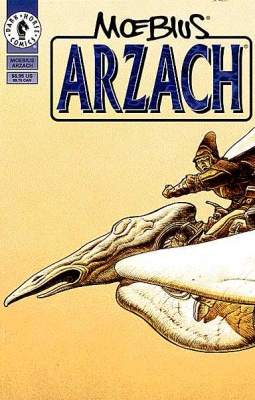“When an artist puts himself in a state where he wants to draw what exists at the deepest level of his consciousness, just on the edge of the subconscious mind, strange things begin to happen.” — Jean Giraud, 1938-2012
Although 2012 was, overall, an excellent year for comics, it also marked the passing of some of comics’ giants, including legendary French artist Jean “Moebius” Giraud. One of Europe’s most distinguished masters, Giraud had a prolific career working on numerous projects, many of which could qualify for their own installment of Off the Cape: the western epic “Blueberry,” sci-fi/fantasy magazines “Metal Hurlant” and “Heavy Metal,” “The Airtight Garage,” “The Long Tomorrow,” and, of course, his collaboration with Alejandro Jodorowsky, “The Incal.” English language editions of his books are, however, few and far between, and since his passing have appeared to soar in value, quickly becoming unobtainium for the casual collector. I thought I’d narrow down the list to what might be one of the easiest of his works to find here in the States, and my personal favorite, “Arzach,” a silent tale of a lone warrior and his albino pterodactyl steed.

Arzach is perhaps one of Moebius’ most famous creations, one he would revisit many times throughout his career. There has been a novelization, an animated film, and the first of a sadly unfinished trilogy of graphic novels depicting the character’s origin story. Even the original short stories have seen several editions since their original publication in “Metal Hurlant,” so I think it’s helpful for me to narrow it down even further. What I’ve got is the 1996 Dark Horse softcover edition entitled “Moebius: Arzach.” It contains the four original silent stories, a narrated Arzach short, and four other short stories: “The Detour,” “The Ballade,” “The White Citadel,” and “Ktulu,” which is, of course, a tribute to H.P. Lovecraft. At 6″x9″ and 80 pages, it’s a slim, unassuming little trade that belies the grandeur of its content.

Moebius said that in order to imagine the world and adventures of Arzach, he focused on negative emotions and the line between the conscious and unconscious mind. The world of Arzach is a dark, hellish realm full of evil wizards, terrifying monsters, tentacled forests, endless deserts, the bleached skeletons of ancient, massive beasts, monsters disguised as beautiful women, and hordes of huddled, naked, feral-looking men. “Arzak” was constructed from the darkest regions of the artist’s soul, condensed into ink and brought to life on the page in all of their naked glory. Emphasis on the naked, as the book is full of full frontal nudity, mostly male. It’s far from pornographic, though, and more as if, since the book is baring so much of the artist’s soul already, it might as well go the full monty.

It’s easy to see why Giraud’s imagination was tapped for concept design work on movies like “Alien,” “Tron,” “Willow” and “The Fifth Element.” Arzach is like a dystopian, demonic Dinotopia in its expansiveness, timelessness and intricately detailed, storybook-style art. A world this imaginative could only have come from one of comics’ greatest creative minds. The stories are too few and far too short, but the creatures of Jean Giraud’s nightmares inspire our own imaginations to dream of dark, distant lands full of danger and adventure. You may finish reading them quickly, but you won’t be able to get them out of your head for a long time. These are the types of stories guaranteed to ignite your imagination
The Arzach comics were very experimental in nature. They were silent, relying only on the artwork to tell the story. They had fancy, storybook-style layouts and intricately detailed panels. The art is highly detailed and has a stony texture, as if it’s frozen in time or etched in to stone. Despite the dark, silent nature of the comics, Moebius still found a way to sneak in a fun little play on words by changing the spelling of the character’s name in the title page of each short to Arzach, Harzak, Arzak, Harzakc and Harzach.

While you’ll be hard-pressed to find this Dark Horse softcover edition online for less than $100, I suspect they are a bit more common than people realize, as I’ve seen them go for much cheaper at sales. The stories have seen several American collections, too, including the Epic collection “Moebius 2: Arzach,” the 1977 “Heavy Metal Presents: Arzach” softcover, and the original issues of “Heavy Metal” they were reprinted in. These versions may be a bit easier to find at less of a markup, but may not include the final, wordy chapter, “The Detour,” or any of the bonus stories or materials.

It may take some effort to track down, but if you’re a collector who likes a good hunt, keep your eyes open in those dark, dusty longboxes for this slim, unassuming volume containing one of the great works of one of comics’ most renowned craftsmen. I assure you it’s worth the effort; this is a book you will cherish for years to come.






